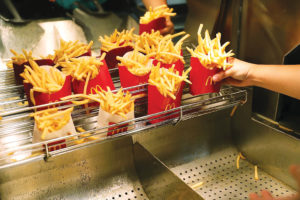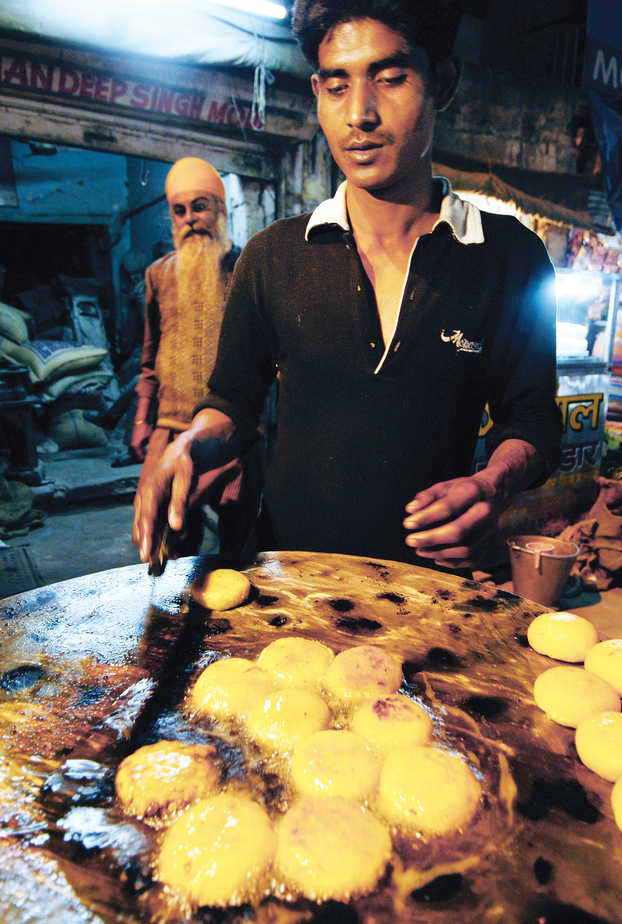Biofuel plants will soon include used cooking oil as a part of their mix, helping restaurants dispose of their stock in ethical ways — and preventing harm to health and environment
Many households reuse cooking oil, that oil left in the pan after deep frying processed foods or puris and pappadoms. Only now is word spreading that this oil is hazardous to health. And if you pour it down the drain, it leads to blockages.
Homes still use a reasonably minuscule amount of oil compared to the amount guzzled by eateries in India and its cities. Be it the roadside joint frying up samosas or a fast food chain like McDonalds, oil is used in gallons and has huge scope for being misused. The Food Safety and Standards Authority’s (FSSAI) regulations for monitoring quality of used cooking oil came into effect on July 1 but no one knows yet whether kitchens are complying with them.
The new regulations have set the maximum permissible limit of Total Polar Compound (TPC) in edible oil at 25 per cent. Repeated frying and usage of edible oil changes its physiochemical and nutrition properties and leads to the formation of TPC, which makes it unfit for human consumption.
A solution is now in sight that may solve the problems of both households and restaurants. Used cooking oil is being considered as a reasonably good feedstock for biodiesel production. This new technology will give restaurants a way to safely dispose of their used stock. Furthermore, the use of waste cooking oil would free up land now being used for crops like palm trees, corn and sugarcane, which are used for biodiesel.

FSSAI says that annually 23 million tonne of cooking oil is consumed in India, which means it has a potential to recover and use about 3 million tonne of this for production of bio-diesel, with an estimated value of Rs 18,000 crore per year.
With soaring oil prices in the country, an alternative source of fuel would be more than welcome, not to forget the huge implications it would have on our environment. Global warming is an ever present reality today, with the world getting choked by our use of petrol- and diesel-powered vehicles, airlines and industries.
Airlines use a criminal amount of fuel — so when recently Spice Jet flew a plane from Dehradun to Delhi completely powered by biofuel, it was a moment to celebrate.
In the case of restaurants, it is McDonald’s in Mumbai which decided to take matters into its hands. It became the first fast food chain in the country to use biodiesel, produced from used cooking oil, to power its trucks.
Hardcastle Restaurants, a McDonald’s franchisee in west and south India, said it is converting 4.5 lakh litres of used cooking oil annually (or over 35,000 litres per month) into biodiesel. This is being used to power 20-25 trucks that made trips to around 275 restaurants carrying supplies from its distribution centre.
It has also entered Pune now. But in Delhi there’s no news of such a venture. Connaught Plaza Restaurants Pvt Ltd (CPRL), is the north and east India licensee of American fast food chain McDonald’s, so priorities and plans may not be on the same plane.
When Patriot contacted the corporate offices of McDonald’s and KFC over email, there was no response. At McDonald’s outlets, they refused to answer questions on reuse of oil, or how many times it is changed in a day.
In 2016, IIT Delhi students had innovated a technology which converts waste cooking oil into bio-diesel. Called FAME One their innovation was to help small-scale hotels, restaurants and even households.
The started experimenting by collecting waste cooking oil from their own homes and hostel mess, the team did several experiments and finally came up with a final prototype called FAME One.
The prototype is a washing machine-sized device which takes around an hour time to convert waste cooking oil into biodiesel. Once the process was successful, they did a market survey. This revealed that almost 75 per cent of the cost will go only in collecting the waste oil and bringing it to the central location of the plant.
So it makes sense that companies sell their used cooking oil to firms registered for collection which can then be further sold to the biofuel companies in the cities.
The use of used cooking oil for biodiesel will also keep in check the oil that reaches street vendors. According to the FSSAI, many a times big restaurants sell their used oil to these vendors. Keeping this unethical practice in check and making big companies accountable would help stop such malpractices. It seems a win-win all around.
Rapid action
FSSAI has identified 64 companies at 101 locations in India to enable collection of used cooking oil.
Bangalore-based ECO Green Fuels is also currently converting approximately 1,200 tonne of UCO to biodiesel annually. Another company in Delhi-NCR Bio Energy (India) Pvt Ltd has a plant that produces 100 tonnes per day in Bawal, Haryana. Kaleesuwari Refinery Pvt Ltd has a biodiesel plant and is in the process of rolling out the conversion mechanism.





